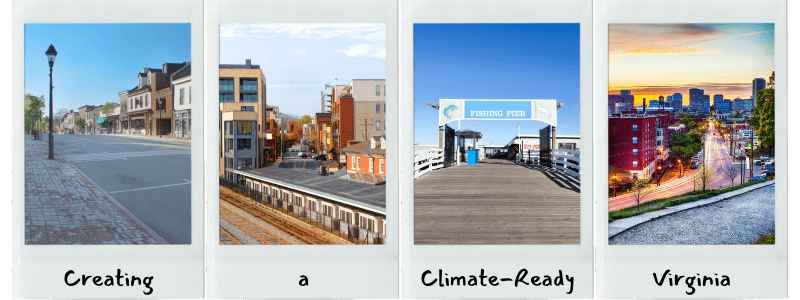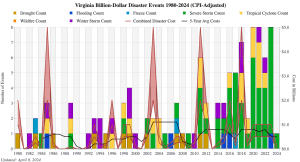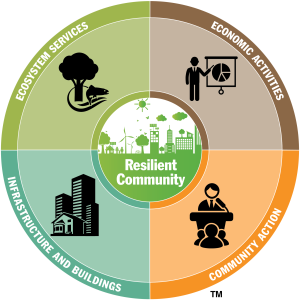
Virginia's Climate History
 Between 1980 and 2024, Virginia has experienced 107 confirmed weather/climate disaster events with losses exceeding $1 billion each. These major disasters are happening more frequently, with the last 5 years seeing a tripling of annual $1 billion severe events.
Between 1980 and 2024, Virginia has experienced 107 confirmed weather/climate disaster events with losses exceeding $1 billion each. These major disasters are happening more frequently, with the last 5 years seeing a tripling of annual $1 billion severe events.
Virginians are experiencing more extreme weather events, flooding (coastal, riverine, and flash floods), wildfires, drought, and a pattern of hotter summers and milder winters with less snow and earlier snow melt. Coupled with these climate impacts, changes in economic activity, population migration, aging infrastructure, and lack of capacity are hampering the ability of Virginia’s communities to remain providers of essential economic and social services.
Creating Climate-Ready Communities
 Climate readiness is about building holistic resilience. It involves taking targeted action to preserve and improve Virginia’s economy, infrastructure, and resources while safeguarding our community members’ health, safety, and quality of life. Resilient Virginia recognizes that climate-readiness will look different for each community and due to historic and systemic racism, some communities will need more resources than others to foster comprehensive change. Because of this, we provide assistance through a variety of means to meet these diverse needs.
Climate readiness is about building holistic resilience. It involves taking targeted action to preserve and improve Virginia’s economy, infrastructure, and resources while safeguarding our community members’ health, safety, and quality of life. Resilient Virginia recognizes that climate-readiness will look different for each community and due to historic and systemic racism, some communities will need more resources than others to foster comprehensive change. Because of this, we provide assistance through a variety of means to meet these diverse needs.
Education and Information Exchange
Resilient Virginia organizes a variety of educational opportunities for an audience of government, business, academic, and nonprofit leaders. Our conferences, Resiliency Academy webinars, and Special Session workshops offer attendees a space to learn directly from the experts and participate in interactive discussions. In addition, Resilient Virginia partners with Virginia universities to host student interns and design graduate-level community resilience assignments. Our website also features comprehensive resource and funding hubs.
Previous webinars and conferences have covered topics such as resiliency planning “how-tos” for local governments; disaster mitigation funding; economic impact and opportunities; sustainable building and infrastructure design; and the role of ecosystems in community resilience.
Community Outreach and Engagement
Resilient Virginia works directly with communities to identify and address risks and challenges; build local leadership and empower community members to get involved in developing resilience solutions; and gather risk assessment data to provide to government entities. We do this through providing a safe and open space for discussion; listening and recording stakeholder issues; and focusing on equitable solutions.
Resilient Virginia is currently working with Virginia Energy on community outreach and engagement in historically economically disadvantaged communities for the Virginia Energy Resilience Study, supporting VCU Research Institute for Social Equity’s outreach and engagement work in the Environmental Justice Data Project, and, in 2023, completed an environmental justice outreach and engagement project that focused on addressing flooding risk in underserved Lynchburg neighborhoods.
Collaborative Alliance
The Resilient Virginia Collaborative Alliance (RVCA) is led by Resilient Virginia through cross-sector partnerships with diverse organizations that are dedicated to addressing resiliency planning for communities in Southwest and Central Virginia. The RVCA is building regional capacity to address equity, economic, social, and climate challenges; creating a roadmap for regional climate resilience; and integrating climate mitigation and adaptation strategies to address challenges and take advantage of opportunities.
Resilient Virginia has worked with the Core Steering Committee to develop the Vision, Mission, and Goals of the RVCA. In April 2024, two Working Groups, focused on Water Infrastructure and Clean Transportation, started monthly meetings. Agriculture and Emergency Management Working Groups are being formed.
To learn more about Resilient Virginia’s programs and projects, please browse through our website!




